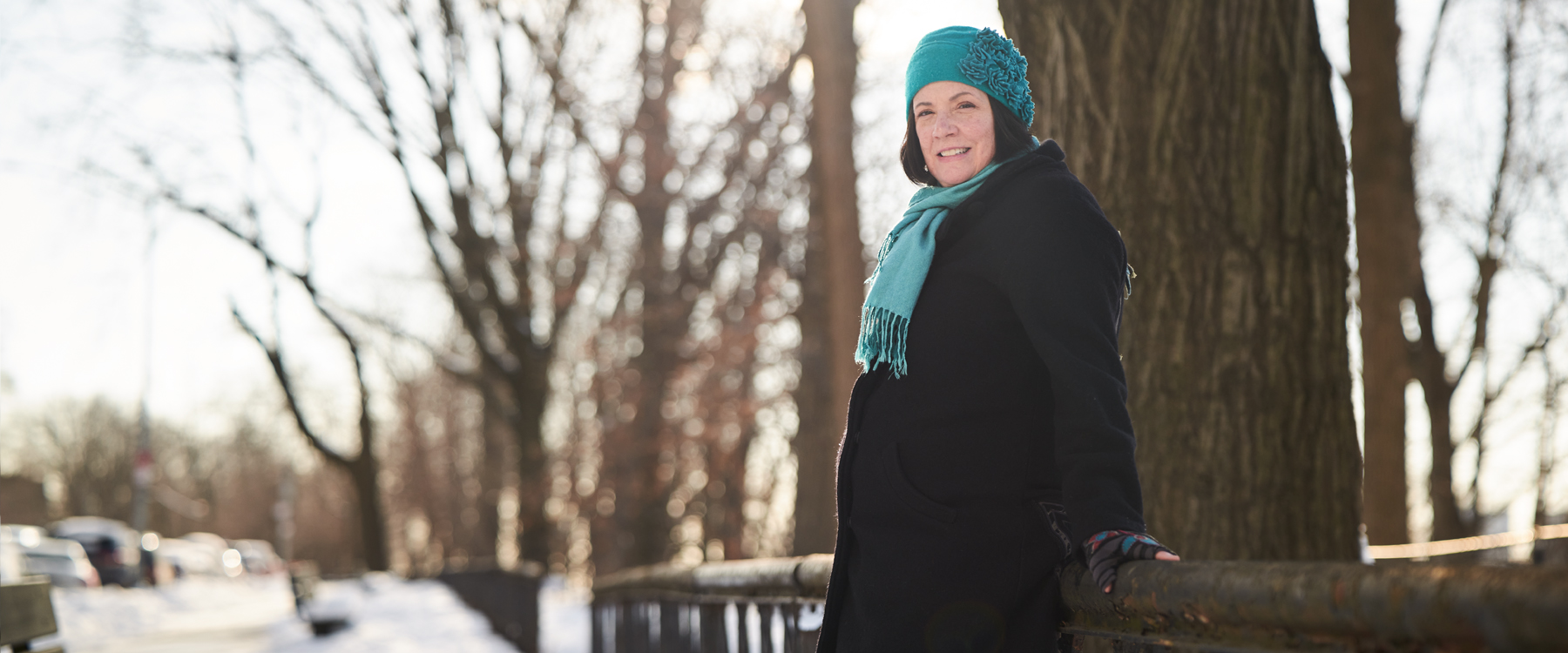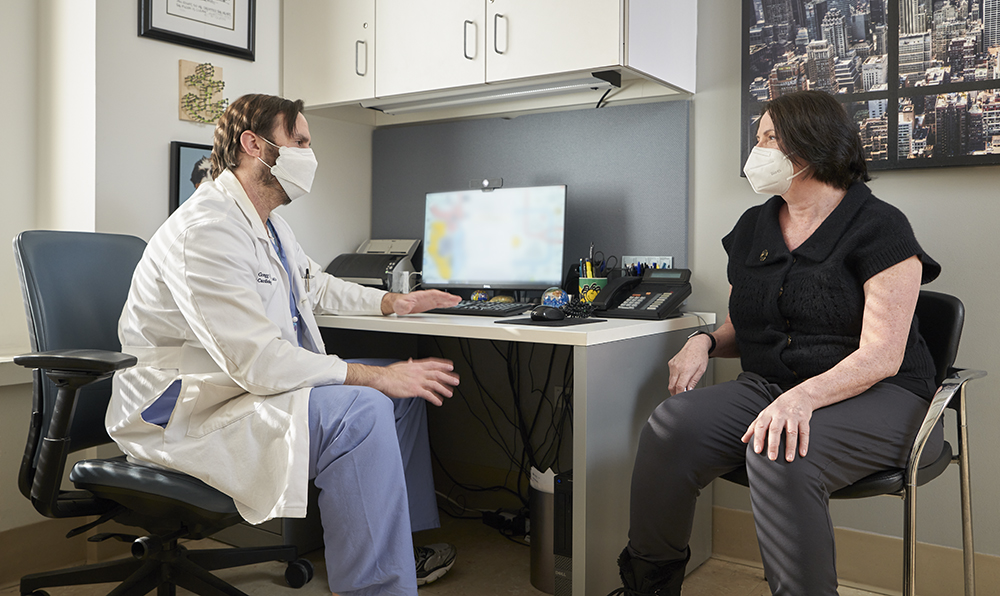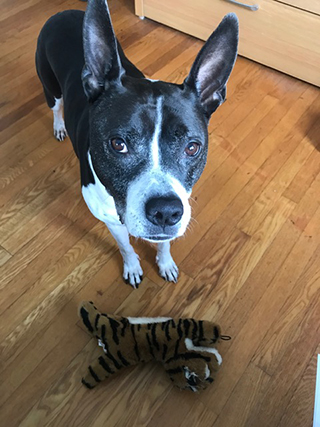A Patient Finds ‘Peace of Mind’ Thanks to New Technology That Tracks Her Heart From Afar
A new Bluetooth device that transmits heart data directly to her doctors ensures that Mary Darby’s care never skips a beat.

Many afternoons, when the weather is nice, you can find Mary Darby enjoying a quiet walk around the local park by her apartment in Inwood. The fact that Mary, 59, can enjoy a daily stroll is remarkable, considering her life six months earlier was far from a walk in the park.
In August 2020, Mary was in a coma for three weeks after suffering cardiac arrest following surgery to address her mitral valve prolapse, a congenital heart condition in which the valve between the heart’s upper and lower left chambers fails to close properly. In order for her care team to closely monitor her heart health post-surgery — and for years to come — Mary became one of the first patients in the U.S. to have a small implantable cardioverter defibrillator (ICD) with Bluetooth technology surgically placed under the skin of her upper chest. Now she no longer needs to worry about irregularities going unnoticed, because the device allows her doctors to keep a close eye on her heart’s activity no matter where she goes.
“The device brings me tremendous peace of mind,” says Mary, who works in public relations for nonprofits. “It’s an extra level of insurance against something bad happening.”
Dr. Gregg Rosner, Mary’s cardiologist at NewYork-Presbyterian/Columbia University Irving Medical Center, recommended the cutting-edge technology, which is designed for patients who, like Mary, have abnormal heart rhythms or heart failure. When a patient experiences a fast, potentially dangerous heart rate, the device will send a small electric pulse or shock to restore a normal heartbeat. The Bluetooth technology, available in the latest devices created by Abbott, enables the device to send important data about the patient’s heart directly to the care team through a mobile app — so if there is a problem, the physician will get an alert.
“This advance is groundbreaking and life-changing for patients,” says Dr. Rosner, who is also an assistant professor of medicine at Columbia University Vagelos College of Physicians and Surgeons. “Traditionally, a patient has to hook up a device to their landline and stay within 10 to 15 feet of it in order for it to relay data remotely. But now that everyone has a cellphone it makes much more sense to connect through that. It’s the way of the future and a great example of leveraging advanced technology to make care more convenient.”

Mary Darby meets with her cardiologist, Dr. Gregg Rosner.
Keeping a Close Eye
Mary learned she had mitral valve prolapse more than 30 years ago while living in Washington, D.C. “It was so mild at the time that I didn’t have to do anything about it,” she says.
By summer 2019, when she was living in New York City, her primary care doctor at NewYork-Presbyterian Allen Hospital, Dr. Stuart Framm, noticed a heart murmur and ordered an echocardiogram, an ultrasound that details how the heart’s muscles and valves are working. “After taking that test, I learned my condition had worsened,” Mary says. At the same time, she began experiencing heart palpitations.
She went to see Dr. Rosner in the fall of 2019; he began monitoring her heart health closely and prescribed medication to reduce her palpitations. By June 2020, her symptoms had worsened, and included a rapid and irregular heartbeat and brief dizzy spells. After more tests, Dr. Rosner recommended surgery.
During her surgery in August, doctors discovered they needed to replace her valve rather than simply repair it, which, in addition to other complications, made her recovery more challenging. At one point, Mary temporarily required mechanical support to replace the function of her heart and lungs.
“All things considered, I’m doing really well now. I pulled out of it with the help of the great doctors at NewYork-Presbyterian,” she says.
“She’s so determined and amazing, and really recovered remarkably well after everything that happened,” says Dr. Rosner.
Mary lives with her dog, a pit bull/Boston terrier mix named Pepper, and appreciates how the device has not only made her feel safer, but also made her health care more convenient during her recovery. If she touches her chest, she can feel the device, which measures 2.5 by 2 inches. Otherwise she forgets it’s there, even though it continuously records and transmits her data so her doctors can check for arrhythmias and also monitor how the device is working.
It’s also made doctor-patient communications easier. Mary recalls discussing her vitals during a recent telehealth visit with Dr. Rosner. After living with a heart condition for so long, she knew what to report, but this time she was surprised at how easy her checkup was with the new device. “I had just done a blood pressure reading with a home cuff. And I said, ‘Do you need my pulse too?’ He said, ‘No, I have that right here in front of me because your device is sending it to me,’” says Mary.
“When Dr. Rosner first told me about the device, I thought, ‘Of course I should get this.’ And I’m very glad I did,” she adds. “It’s reassuring and a comfort to know I have this kind of fail-safe if something goes wrong.”

Mary looks forward to walking her dog, Pepper, again soon. For now, she relies on dog walkers as she continues to build her strength.
Convenient Care During COVID-19
The remote monitoring provided by the device also means fewer in-person doctor’s visits for Mary, whose heart condition puts her in a high-risk group for COVID-19 — so it was even more important over the past several months to limit her personal interactions.
“Digital health and the ability to monitor patients remotely is really key in healthcare, particularly during COVID,” says Dr. Elaine Y. Wan, the cardiac electrophysiologist at NewYork-Presbyterian/Columbia who implanted Mary’s defibrillator with a minimally invasive procedure. “With technology like this, we can still take care of our patients and check on them, even though they are not physically in our office.” Dr. Wan is also the Esther Aboodi Assistant Professor of Medicine at Columbia University Vagelos College of Physicians and Surgeons.
Today, Mary is grateful for the progress she has made. She no longer needs a walker, as she did when she was first discharged from the hospital. When she can’t go outside for exercise, she sometimes walks up and down 15 flights of stairs in her building. “It’s not much fun, but it gives me pretty good exercise,” she says.
As for Pepper, who weighs 60 pounds, Mary relies on dog walkers to take her outside, but she looks forward to the day when she can take the reins. “She’s a healthy girl, so I have to pace myself there!” she says.
Overall, “I’m really happy to have survived all this,” says Mary. “My prognosis is good. And I’ve had so much support from my family, friends, work, and my care team — and I’m so grateful for that.”
For more information or an electrophysiology consultation at NewYork-Presbyterian/ Columbia University Irving Medical Center, visit https://www.nyp.org/heart/electrophysiology. Other members of the electrophysiology team include Dr. Hirad Yarmohammadi, Dr. Deepak Saluja, Dr. Angelo Biviano and Dr. Hasan Garan.
Dr. Rosner and Dr. Wan report no conflicts with Abbott.
